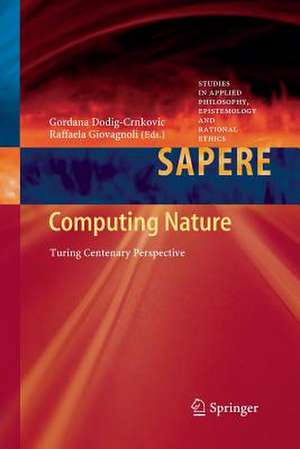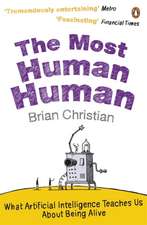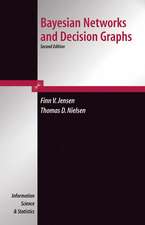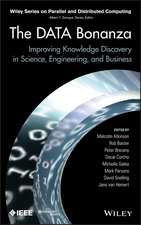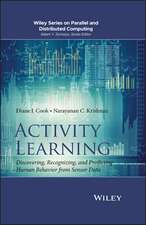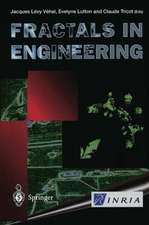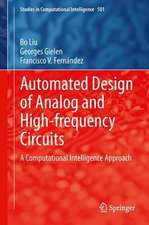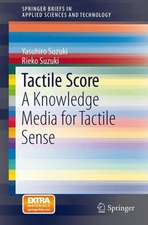Computing Nature: Turing Centenary Perspective: Studies in Applied Philosophy, Epistemology and Rational Ethics, cartea 7
Editat de Gordana Dodig-Crnkovic, Raffaela Giovagnolien Limba Engleză Paperback – 12 apr 2015
Regarding our computational models of natural phenomena Feynman famously wondered: “Why should it take an infinite amount of logic to figure out what one tiny piece of space/time is going to do?” Phenomena themselves occur so quickly and automatically in nature. Can we learn how to harness nature’s computational power as we harness its energy and materials?
This volume includes a selection of contributions from the Symposium on Natural Computing/Unconventional Computing and Its Philosophical Significance, organized during the AISB/IACAP World Congress 2012, held in Birmingham, UK, on July 2-6, on the occasion of the centenary of Alan Turing’s birth. In this book, leading researchers investigated questions of computing nature by exploring various facets of computation as we find it in nature: relationships between different levels of computation, cognition with learning and intelligence, mathematical background, relationships to classical Turing computation and Turing’s ideas about computing nature - unorganized machines and morphogenesis. It addresses questions of information, representation and computation, interaction as communication, concurrency and agent models; in short this book presents natural computing and unconventional computing as extension of the idea of computation as symbolmanipulation.
| Toate formatele și edițiile | Preț | Express |
|---|---|---|
| Paperback (1) | 644.66 lei 6-8 săpt. | |
| Springer Berlin, Heidelberg – 12 apr 2015 | 644.66 lei 6-8 săpt. | |
| Hardback (1) | 649.28 lei 6-8 săpt. | |
| Springer Berlin, Heidelberg – 6 apr 2013 | 649.28 lei 6-8 săpt. |
Din seria Studies in Applied Philosophy, Epistemology and Rational Ethics
- 20%
 Preț: 603.89 lei
Preț: 603.89 lei -
 Preț: 397.59 lei
Preț: 397.59 lei -
 Preț: 359.53 lei
Preț: 359.53 lei - 20%
 Preț: 989.96 lei
Preț: 989.96 lei - 24%
 Preț: 787.48 lei
Preț: 787.48 lei -
 Preț: 390.08 lei
Preț: 390.08 lei -
 Preț: 370.88 lei
Preț: 370.88 lei - 15%
 Preț: 641.20 lei
Preț: 641.20 lei - 20%
 Preț: 991.60 lei
Preț: 991.60 lei - 20%
 Preț: 646.95 lei
Preț: 646.95 lei - 15%
 Preț: 653.98 lei
Preț: 653.98 lei -
 Preț: 384.48 lei
Preț: 384.48 lei -
 Preț: 395.47 lei
Preț: 395.47 lei - 18%
 Preț: 1216.95 lei
Preț: 1216.95 lei - 18%
 Preț: 947.50 lei
Preț: 947.50 lei -
 Preț: 388.72 lei
Preț: 388.72 lei -
 Preț: 390.08 lei
Preț: 390.08 lei -
 Preț: 395.09 lei
Preț: 395.09 lei -
 Preț: 394.12 lei
Preț: 394.12 lei - 15%
 Preț: 644.82 lei
Preț: 644.82 lei - 15%
 Preț: 698.15 lei
Preț: 698.15 lei - 18%
 Preț: 1840.91 lei
Preț: 1840.91 lei - 20%
 Preț: 656.84 lei
Preț: 656.84 lei -
 Preț: 389.70 lei
Preț: 389.70 lei - 20%
 Preț: 991.46 lei
Preț: 991.46 lei - 15%
 Preț: 585.73 lei
Preț: 585.73 lei - 15%
 Preț: 711.40 lei
Preț: 711.40 lei - 15%
 Preț: 589.33 lei
Preț: 589.33 lei - 15%
 Preț: 700.42 lei
Preț: 700.42 lei
Preț: 644.66 lei
Preț vechi: 805.82 lei
-20% Nou
Puncte Express: 967
Preț estimativ în valută:
123.35€ • 129.14$ • 102.07£
123.35€ • 129.14$ • 102.07£
Carte tipărită la comandă
Livrare economică 05-19 aprilie
Preluare comenzi: 021 569.72.76
Specificații
ISBN-13: 9783642428708
ISBN-10: 3642428703
Pagini: 280
Ilustrații: VI, 269 p.
Dimensiuni: 155 x 235 x 15 mm
Greutate: 0.4 kg
Ediția:2013
Editura: Springer Berlin, Heidelberg
Colecția Springer
Seria Studies in Applied Philosophy, Epistemology and Rational Ethics
Locul publicării:Berlin, Heidelberg, Germany
ISBN-10: 3642428703
Pagini: 280
Ilustrații: VI, 269 p.
Dimensiuni: 155 x 235 x 15 mm
Greutate: 0.4 kg
Ediția:2013
Editura: Springer Berlin, Heidelberg
Colecția Springer
Seria Studies in Applied Philosophy, Epistemology and Rational Ethics
Locul publicării:Berlin, Heidelberg, Germany
Public țintă
ResearchCuprins
From the Contents: Computing Nature – A Network of Networks of Concurrent Information Processes.- A Framework for Computing Like Nature.- The Coordination of Probabilistic Inference in Neural Systems.-Neurobiological Computation and Synthetic Intelligence.-Nature-like Computation and a Measure of Programmability.- Alan Turing’s Legacy: Info-Computational Philosophy of Nature.- Dualism of Selective and Structural Information in Modelling Dynamics of Information.- Intelligence And Reference. Formal Ontology Of The Natural Computation.- Representation: Analytic Pragmatism and AI.- Salient Features and Key Frames: An Interdisciplinary Perspective on Object Representation.
Textul de pe ultima copertă
This book is about nature considered as the totality of physical existence, the universe, and our present day attempts to understand it. If we see the universe as a network of networks of computational processes at many different levels of organization, what can we learn about physics, biology, cognition, social systems, and ecology expressed through interacting networks of elementary particles, atoms, molecules, cells, (and especially neurons when it comes to understanding of cognition and intelligence), organs, organisms and their ecologies?
Regarding our computational models of natural phenomena Feynman famously wondered: “Why should it take an infinite amount of logic to figure out what one tiny piece of space/time is going to do?” Phenomena themselves occur so quickly and automatically in nature. Can we learn how to harness nature’s computational power as we harness its energy and materials?
This volume includes a selection of contributions from the Symposium on Natural Computing/Unconventional Computing and Its Philosophical Significance, organized during the AISB/IACAP World Congress 2012, held in Birmingham, UK, on July 2-6, on the occasion of the centenary of Alan Turing’s birth. In this book, leading researchers investigated questions of computing nature by exploring various facets of computation as we find it in nature: relationships between different levels of computation, cognition with learning and intelligence, mathematical background, relationships to classical Turing computation and Turing’s ideas about computing nature - unorganized machines and morphogenesis. It addresses questions of information, representation and computation, interaction as communication, concurrency and agent models; in short this book presents natural computing and unconventional computing as extension of the idea of computation as symbolmanipulation.
Regarding our computational models of natural phenomena Feynman famously wondered: “Why should it take an infinite amount of logic to figure out what one tiny piece of space/time is going to do?” Phenomena themselves occur so quickly and automatically in nature. Can we learn how to harness nature’s computational power as we harness its energy and materials?
This volume includes a selection of contributions from the Symposium on Natural Computing/Unconventional Computing and Its Philosophical Significance, organized during the AISB/IACAP World Congress 2012, held in Birmingham, UK, on July 2-6, on the occasion of the centenary of Alan Turing’s birth. In this book, leading researchers investigated questions of computing nature by exploring various facets of computation as we find it in nature: relationships between different levels of computation, cognition with learning and intelligence, mathematical background, relationships to classical Turing computation and Turing’s ideas about computing nature - unorganized machines and morphogenesis. It addresses questions of information, representation and computation, interaction as communication, concurrency and agent models; in short this book presents natural computing and unconventional computing as extension of the idea of computation as symbolmanipulation.
Caracteristici
Presents recent advances in natural computation, intended as computation found in nature, computation performed by natural materials and computation inspired by nature Analyzes the relevance of the relationship between human representation and machine representation, the contrast between symbolic representation and processing on the one hand and nature-inspired, non-symbolic forms of computation on the other hand, with a special focus on connectionism Includes a selection of contributions from the Symposium on Natural Computing/Unconventional Computing and Its Philosophical Significance held during the AISB/IACAP World Congress 2012 in Birmingham, UK Edited and written by leading experts in the field
